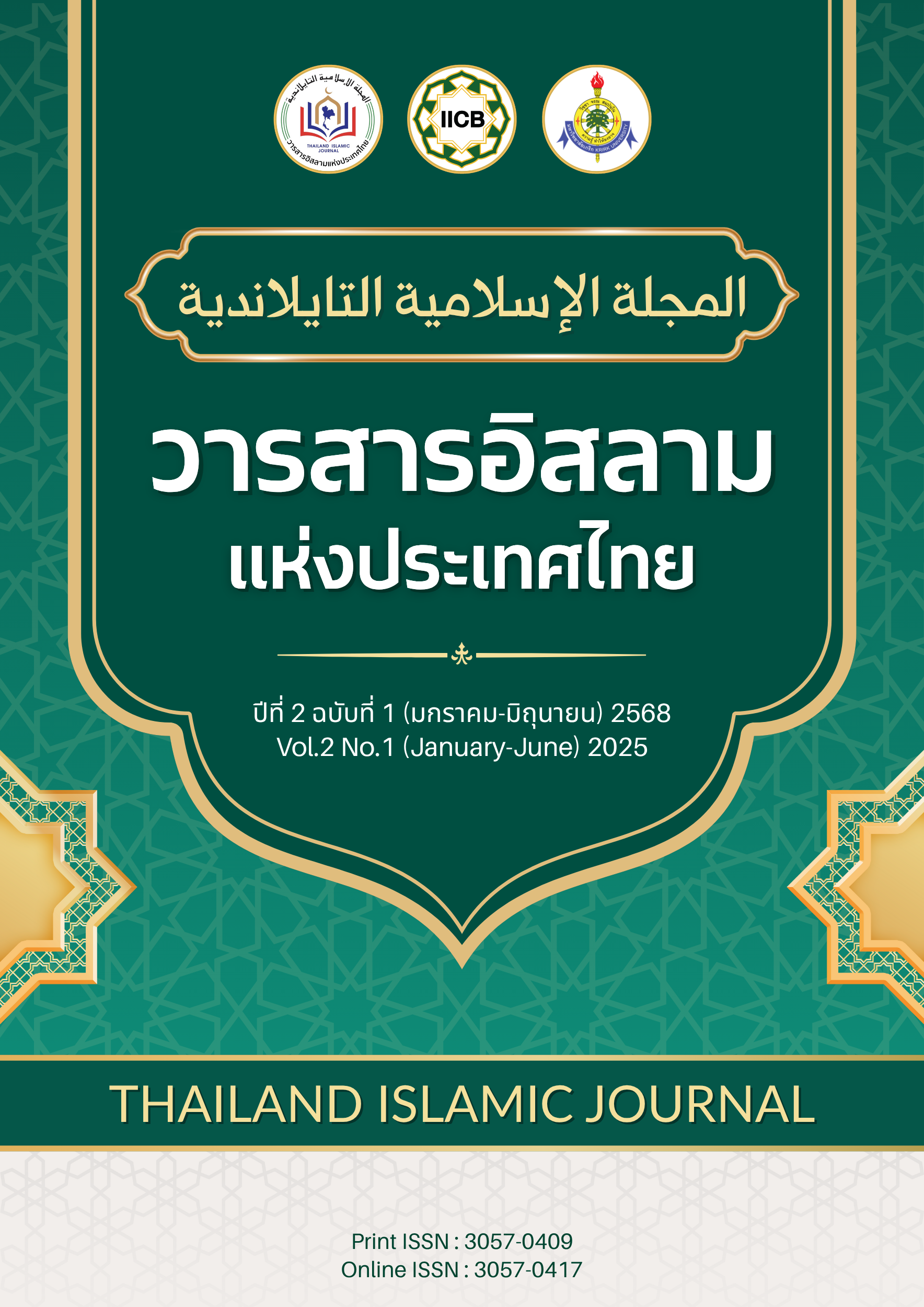A Study on the Differences in Motivation and Online Purchasing Behavior between Male and Female Muslim Consumers in Thailand.
Keywords:
Online shopping, Muslim consumers, Hedonic Motivation, Gender Differences, Utilitarian MotivationAbstract
Abstract
The rapid expansion of e-commerce has transformed consumer purchasing behavior globally, with online shopping gaining significant traction among Thai consumers. Among these, Muslim consumers represent a unique segment whose purchasing decisions are shaped by both general consumer behavior factors and religious-cultural considerations. This study addresses this gap by examining the utilitarian and hedonic motivations of Muslim consumers in Thailand and their influence on online purchasing behavior, with a focus on gender differences. Using an Independent Samples Test, significant differences were found in both hedonic and utilitarian motivations between male and female consumers, with women exhibiting higher levels of both motivational drivers. Additionally, women demonstrated significantly higher levels of online purchasing behavior compared to men. Multiple Regression Analysis revealed that hedonic motivation significantly influenced online purchasing behavior for both genders, while utilitarian motivation had no significant impact. Hedonic motivation explained 8.9% and 12.4% of the variance in online purchasing behavior for male and female consumers, respectively, highlighting its role as a key driver. However, the relatively low explanatory power suggests the need to explore additional factors influencing this behavior.
References
References
Akhlaq, A & Ahmed, E. (2016). Gender Differences Among Online Shopping Factors in Pakistan. Organizations and Markets in Emerging Economies. 7. Doi: 10.15388/omee.2016.7.1.14216.
Alimo, P. (2020). The Influence of Gender on Online Consumer Decision Making: A Review. The International Journal of Business & Management. Doi: 10.24940/theijbm/2020/v8/i7/BM2007-053.
Al-Hyari, K., Alnsour, M., Al-Weshah, G., & Haffar, M. (2012). Religious beliefs and consumer behavior: From loyalty to boycotts. Journal of Islamic Marketing, 3(2), 155–174. Doi: https://doi.org/10.1108/17590831211232564
Babin, B. J., Darden, W. R., & Griffin, M. (1994). Work and/or fun: Measuring hedonic and utilitarian shopping value. Journal of Consumer Research, 20(4), 644–656. Doi: https://doi.org/10.1086/209376
Hair, J. F., Celsi, M. W., Oritinau, D. J., & Bush, R. P. (2013). Essential of Marketing Research (3rd ed.). New York: McGraw-Hill.
Hasan, A. (2019). Muslim Customer Behavior in Halal Food Online Purchasing. Journal of Islamic Monetary Economics and Finance. 5. 517-540. Doi: 10.21098/jimf.v5i3.1152.
Koc, F., Ozkan, B., Komodromos, M., Efendioglu, I. H. and Baran, T. (2025), The effects of trust and religiosity on halal products purchase intention: indirect effect of attitude, EuroMed Journal of Business, 20(5), 141-165. https://doi.org/10.1108/EMJB-01-2024-0004
Kasikorn Research Center. (2023). The growth of e-commerce in Thailand and consumer behavior trends. Retrieved from
https://www.kasikornresearch.com
Muflih, Betania & Septi, Iti & Jamaludin, Mohammad & Jaswir, Irwandi. (2023). The Relationship Between Muslim Consumers’ Perception of Halal Certification Toward Purchase Intention of Halal Products. Journal of Halal Industry & Services. Doi: 10.36877/jhis.a0000383.
Ozen, H. & Kodaz E, N. (2016). Utilitarian or Hedonic? A Cross-Cultural Study in Online Shopping. Doi: 10.1007/978-3-319-24148-7_71.
Statista. (2023). E-commerce worldwide – Statistics & facts. Retrieved from https://www.statista.com
Utami, W., Wati, L., & Mulatsih, L. (2021). Analysis of Gender Difference on Online Shopping Lifestyle at Padang City. Journal of Business and Management Review. 2. 569-579. 10.47153/jbmr28.2022021.
Yassierli, Y., Vinsensius, V. & Syed Mohamed, M. (2019). The Importance of Usability Aspect in M-Commerce Application for Satisfaction and Continuance Intention. Makara Journal of Technology. 22. 149. Doi: 10.7454/mst.v22i3.3655.
Downloads
Published
How to Cite
Issue
Section
License
Copyright (c) 2025 Internatinal Islamic College Bangkok, Krirk University

This work is licensed under a Creative Commons Attribution-NonCommercial-NoDerivatives 4.0 International License.
วารสารที่ได้รับการตีพิมพ์เป็นลิขสิทธ์ของวิทยาลัยนานาชาติอิสลามกรุงเทพ มหาวิทยาลัยเกริก
ข้อความที่ปรากฎในบทความแต่ละเรื่องในวารสารวิชาการเล่มนี้เป็นความคิดเห็นส่วนตัวของผู้เขียนแต่ละท่านไม่เกี่ยวข้องกับวิทยาลัยนานาชาติอิสลามกรุงเทพ และคณาจารย์ท่านอื่น แต่อย่างใด ความรับผิดชอบองค์ประกอบทั้งหมดของบทความแต่ละเรื่องเป็นของผู้เขียน




